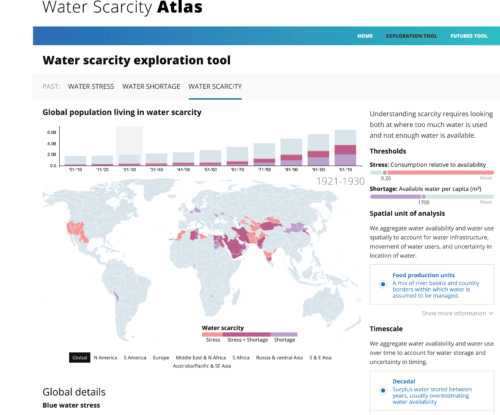The Water Scarcity Atlas (waterscarcityatlas.org) is a freely available educational tool to help us all make more sustainable choices in day-to-day life. It uses interactive global maps to provide an introduction to the problems that arise with limited water – water scarcity – and ways to fight them.

Choices that consumers make here in the North have an effect on the other side of the world. Understanding water scarcity and the impact of your actions is the first step to shaping the future. The Atlas was created as a capacity building tool so that people can better understand what makes their choices sustainable or not.
The Atlas visualizes how water scarcity has evolved over the past 100 years and presents potential scenarios for the rest of this century. The user can explore how different factors such as changes in diet and food losses affect water resources all over the world.
As water use increases, it becomes more difficult to access the resource sustainably. Eating less meat and avoiding food waste can reduce water use. We need to support initiatives by governments, NGOs, and companies with water stewardship programmes. It’s hard to strike a balance between environmental and human needs, especially when there isn’t enough water to go around. We can work together to help farmers and other water users adopt new techniques, and establish effective management arrangements.
The Water Scarcity Atlas is built on cutting-edge research. It is created in collaboration with the International Institute for Applied Systems Analysis (IIASA), which has contributed future scenarios for household and industry water use. Aalto combined analyses of the potential for reducing water use, and global data on water use and availability, modelled by several research groups world-wide as part of the Inter-Sectoral Impact Model Intercomparison Project (ISIMIP). The visualisations were developed with Finnish startup company Lucify.
The Atlas also functions as a platform for researchers working on water scarcity at global scale. The Atlas features a publication database and a dataset database. For young professionals in research, management or business in particular, the Atlas provides an easily accessible and engaging means to get up to speed on water scarcity-related issues, and keep track of cutting edge developments.
We encourage researchers to contribute their own work to the Atlas. Most of the data exists in scattered journal articles. Our platform really allows anyone interested in global water scarcity to stay up to date on the latest research – in an accessible way.
Initial development of the Atlas was funded by the Academy of Finland in the project ‘Global Water Scarcity Atlas: understanding resource pressure, causes, consequences, and opportunities (WASCO)’, for the period 01.10.2016 – 30.09.2018.
Which parts of the world suffer from water shortage and how can you help alleviate water scarcity?
Joseph Guillaume is a Postdoctoral Researcher in the Water and Development Research Group. A version of this post was previously published as a press release from Aalto University

